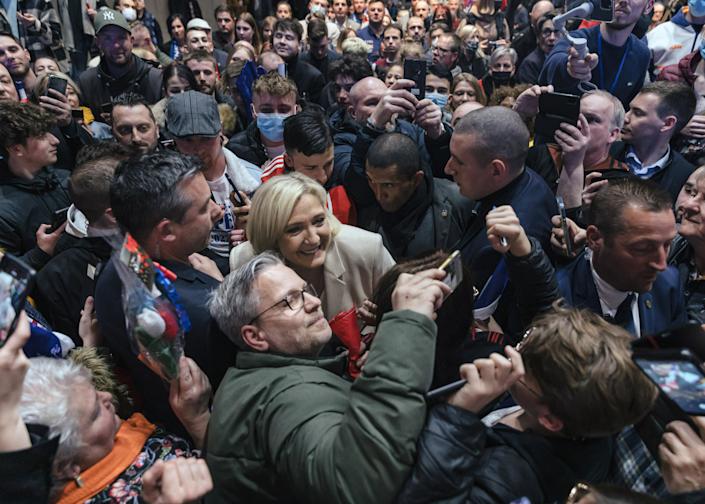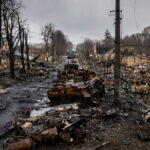
President Joe Biden has described the world as being engaged in a “battle between democracy and autocracy,” and Ukraine has become the central front.
There, Vladimir Putin, the autocratic head of Russia, launched a military invasion meant to destroy a democracy, and his military appears to be committing horrific atrocities in the process. A crucial part of Russia’s war effort is the economic help that it is receiving from another authoritarian government, China. On the other side of the fight, many democracies — including the U.S. and much of Europe — have rallied to support Ukraine, supplying it with arms and placing harsh economic sanctions on Russia.
Sign up for The Morning newsletter from the New York Times
But Ukraine is not the only place where the contest between autocracy and democracy is taking place. It is also happening within several European democracies, through elections rather than military conflict. In these countries, politicians who are friendly to Putin — and share his right-wing, nationalist outlook — are trying to win power.
Two of them appear to have succeeded Sunday. In both Hungary and Serbia, incumbent leaders who are supportive of Putin won reelection. A bigger test will occur this month in France, which will hold its own presidential election — and where a victory by the far-right candidate would be a geopolitical earthquake.
Here’s a look at all three countries.
Hungary
Viktor Orban, Hungary’s Putin-friendly prime minister, appears to have won reelection there. “We won a victory so big that you can perhaps see it from the moon and certainly from Brussels,” Orban told supporters Sunday night, taking a dig at the European Union.
Hungary is the purest example of a democracy sliding toward autocracy. After taking power in 2010 with a legitimate election victory, Orban set about changing the rules to remain in power. He has stacked the courts with allies and used lawsuits to quash critical media coverage. He has aggressively changed election rules.
In each of the past two national elections, Orban’s party, Fidesz, received less than half the votes yet still won a two-thirds supermajority in Parliament. After Sunday’s election, Fidesz appears to be on track to win 135 seats of the 199-seat parliament.
Orban has overseen a government that combines cultural nationalism, economic populism and high-level corruption. His policies have lifted the incomes of many Hungarians, including in the more rural areas that make up his base, while stoking fears of immigrants and, more recently, LGBTQ people.
All of which aligns him with Putin. In recent weeks, Orban has tried to cast himself as a neutral peacemaker in Ukraine, knowing that many Hungarians have long feared Russia. But he has mostly taken Putin’s side.
Hungary has not joined Western Europe’s efforts to provide Ukraine with weapons, and he has opposed efforts within the EU to ban the import of Russian energy. On Sunday, Ukrainian President Volodymyr Zelenskyy described Orban as “virtually the only one in Europe to openly support Mr. Putin.”
Hungary has become the closest thing to a fifth column within NATO and the European Union. It is officially a Western democracy — yet effectively a Putin ally.
Serbia
Serbia’s president, Aleksandar Vucic, has used both Putin and Orban as role models. After becoming president in 2017, Vucic helped turn Serbia’s once-independent media into something more akin to a propaganda machine. In recent months, it has aired rants by pro-Russian commentators and boosted Putin’s lies about Ukraine being a nest of Nazis.
Serbia is not a member of either NATO or the EU, and many of its citizens share Russia’s distrust of the West.
But the country is not strictly pro-Russia. Although Vucic has not imposed sanctions on Russia or suspended flights to Moscow, his government did vote in favor of a U.N. resolution condemning the invasion.
In Sunday’s election, voter turnout was high, but opposition politicians said that they were concerned about foul play. Vucic’s party is on track to keep its hold on Parliament, but with a reduced majority, exit polls indicated.
France
French voters will go to the polls for the first round of a presidential election Sunday. If no candidate receives a majority — and none is likely to — a two-person runoff will take place two weeks later, April 24.
The favorite is the incumbent, Emmanuel Macron. But his lead in the polls is not huge, and the war in Ukraine seems to be hurting him. Inflation was already fairly high in Europe, as it is in much of the world, because of the pandemic. The war has caused prices to rise even further, mostly because of sanctions on Russian oil.
While Macron has focused on trying to find a diplomatic solution in Ukraine — and is failing, so far — his leading opponent has instead focused on the French economy. That opponent is Marine Le Pen, a hard-right candidate.
As The New York Times’ Roger Cohen writes, “Her patient focus on cost-of-living issues has resonated with the millions of French people struggling to make ends meet after an increase of more than 53% in gas prices over the past year.”
Le Pen has a long history of friendliness to Putin. Her party has taken loans from a Russian bank, and she met with him in 2017 in an attempt to strengthen her political image. Until the invasion, Le Pen largely supported Putin’s policies. Even now, she largely opposes hard-line policies toward Putin.
Le Pen trails in the polls by roughly 6 percentage points — a small enough margin for an upset to be conceivable. If she wins, the autocracy-friendly caucus within Europe’s democracies would become far larger than it already is.
“A victory by her,” Cohen writes, “would threaten European unity, alarm French allies from Washington to Warsaw, and confront the European Union with its biggest crisis since Brexit.”
© 2022 The New York Times Company




